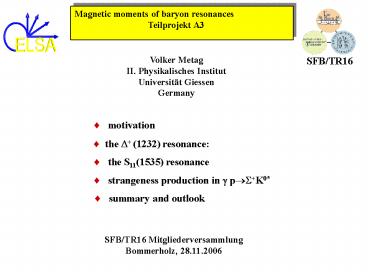PowerPoint-Pr - PowerPoint PPT Presentation
Title:
PowerPoint-Pr
Description:
randomized polarisation. S. Schumann (Mainz) circular polarisation ... S. Schumann (Mainz) B. Boillat (Basel) M. Kotulla et al., PRL89 (2002) 272 001 ... – PowerPoint PPT presentation
Number of Views:32
Avg rating:3.0/5.0
Title: PowerPoint-Pr
1
Magnetic moments of baryon resonances
Teilprojekt A3
Volker Metag II. Physikalisches
Institut Universität Giessen Germany
SFB/TR16
- motivation
- the ? (1232) resonance
- the S11(1535) resonance
- strangeness production in ? p??K0
- summary and outlook
SFB/TR16 Mitgliederversammlung Bommerholz,
28.11.2006
2
- Magnetic moments of hadrons provided testing
ground for - the constituent quark model and baryon
structure calculations
- almost nothing is known about the magnetic
moments of excited baryons
structure calculations D D S11 (1535)
SU(3) 5.58 2.79
Lattice QCD (Cloet et al., PLB 563 (2003)) 4.99(56) 2.49(27)
cQSM (Yang et al., PRD 70 (2004)) 5.39 2.66
experimental values
Castro et al., PLB 517 (2001) 339 6.14 ? 0.51
M.Kotulla. et al., PRL 89, 272001 (2002) 2.7 ? 2.2 ? 3
PDG2004 3.7 - 7.5 2.7 ? 2.2 ? 3
3
Lattice calculation and chiral extrapolation
- extrapolation
- lattice data (quenched) Leinweber (1992)
Cloet,Leinweber,Thomas (2003) Lee et.al.
(2004) - chiral calculations to NLO in d
- expansion V. Pascalutsa, M. Vanderhaeghen
PRL 94 102003 (2005) - for mp lt (M? MN) ? decays imaginary
part is model independent prediction in
chiral EFT framework
?
?
4
Magnetic moment of the ?(1232) resonance
5
TAPS _at_ MAMI 1999
Pioneering experiment
- improvements
- higher statistics
- exploit sensitivity to polarisation observables
- linear and circular photon beam polarisation
?, ?circ
- improved theoretical description
6
CB/TAPS_at_MAMI
g-beam
TAPS forward wall 384 BaF2 modules distance
150 cm angles 1.10 20.00
Crystal Ball 672 NaI - modules
7
Identification of ? p ? p ?0 ? channel
S. Schumann (Mainz)
eliminating background from ? p ? p ?0?0
8
beam asymmetry
discrepancy between data and calculation
!! inclusion of Born terms will reduce
discrepancy (M. Vanderhaegen, priv. com.)
9
follow up experiment with higher polarization
needed !!
10
B. Boillat (Basel)
energy distribution of ?
S. Schumann (Mainz)
M. Kotulla et al., PRL89 (2002) 272 001
improvement in statistics !!
11
B. Boillat (Basel)
angular distribution of ?
S. Schuman (Mainz)
M. Kotulla et al., PRL89 (2002) 272 001
improvement in statistics !!
12
Comparison of present data to pioneering
experiment
13
magnetic moment of S11(1535) resonance
- unpol. LH2 target
- S11(1535) ? p ? p ? ?
- reaction calculation effective Lagrangian model
- total cross section 10nb
- Observables cross sections helicity asymmetry
?circ
Chiang et al., NPA 721 (2003) 731
- expected sensitivity
- assuming 3200 counts (stat error)
- assuming 5 systematic error
- for m1.8mN from energy differential
- cross section
14
reactions with p 4 p0 final state
M. Nanova
- to study baryon resonances through the
measurement of poorly known meson-nucleon and
meson-hyperon decay channels - to study the coupling of vector meson-nucleon
channels to kaon-hyperon states
reactions with strangeness production
15
theoretical predictions
16
theoretical predictions
M. Doering et al., nucl-th/ 0510015
17
theoretical predictions
Q. Zhao et al., PRC 64 ,052201 (2001)
quark model predictions for the K0 and K
photoproductions
significant t-channel kaon exchange
18
kinematic fit ? p ?p 4?0
19
? p ? ? (1189) K0 ? p?0 K0 ?0 ? p 4?0
E? 2000-2150 MeV
? (1189)
K0(892)
Ks0(498)
20
angular distributions
21
Summary and outlook
- strangeness production ? p ? ? (1189) K0 ? p
4?0 - final analysis ongoing paper in preparation
22
circular polarisation
- Circular beam pol.
- 580h _at_ 883 MeV
- 100h _at_ 550 MeV
23
Summary and Outlook
- magnetic dipole moments
- valuable constaints for Baryon structure
calculations - past experiments D(1232)
- successful pioneering experiment for D(1232)
- in progress
- analysis of dedicated experiment Crystal Ball /
TAPS _at_ MAMI cross sections, beam/helicity
asymmetry - coherent program (tests - reaction calculation)
- very large sensitivity to MDM
- future
- generalization to other resonances S11(1535)
24
(No Transcript)
25
- Recent calculation
- cEFT to calculate gp ? p0gp
- systematic ansatz (NLO)
- includes rescattering MDM acquires real and
imaginary part - no Born terms
26
Reaction model calculation
W.-T. Chiang, M. Vanderhaeghen, S. N. Yang, D.
Drechsel, hep-ph/0409078
- based on effective Lagrangian description Born
terms, r,w t-channel exchange, - rescattering included, gauge invariant
- describes simultanously
27
TAPS _at_ MAMI 1999
6 ? 62, 1 ? 138 detectors with individual veto
detector, solid angle 0.40 ? 4? sr
28
TAPS _at_ MAMI 1999
29
Hadron Structure ? Magnetic Moment
- magnetic moments
- well known SU(3) octet baryons (t ? 10-10 s),
- measured with spin precession techniques
- almost unknown for excited states (except
D(1232) ) - a test for baryon structure calculations
(wavefunction) e.g. SU(3)
M1
what are the effective degrees of freedom?
structure calculations D D S11 (1535)
SU(3) 5.58 2.79
Lattice QCD (Cloet et al., PLB 563 (2003)) 4.99(56) 2.49(27)
cQSM (Yang et al., PRD 70 (2004)) 5.39 2.66
experimental values
Castro et al., PLB 517 (2001) 339 6.14 ? 0.51
M.Kotulla. et al., PRL 89, 272001 (2002) 2.7 ? 2.2 ? 3
PDG2004 3.7 - 7.5 2.7 ? 2.2 ? 3






























